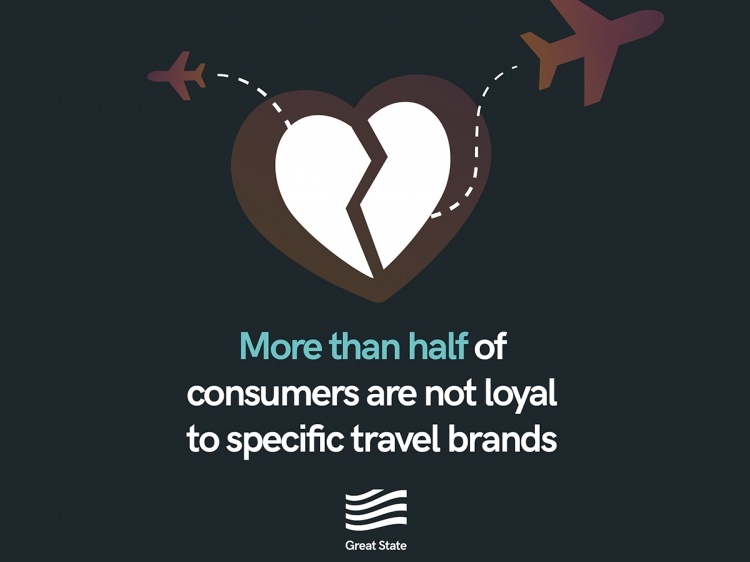
As holiday season draws to a close, brand technology agency, Great State announces results of its Summer holiday consumer survey
London, 3rd December 2018: Over half (52%) of UK holidaymakers do not consistently book with the same providers according to new research from brand technology agency, Great State.
In total over 1000 UK consumers* were surveyed, to explore their attitudes and behaviours in relation to leisure travel and travel brands. The research was commissioned to uncover how the UK’s holiday makers are booking holidays now, their habits and what this means for travel brands in a competitive marketplace.
This lack of loyalty is most evident amongst those in higher income brackets, with almost three quarters of those earning over £65,000 saying they never book with the same provider consistently. When it comes to age, consumers aged 55+ are least trusting of any one provider to provide an end-to-end experience, with 15% saying they wouldn’t trust any provider compared to a 9% average.
Attitudes vary greatly according to geography. Consumers in Wales appear to be the most fickle with over two thirds (66%) saying they never book with the same provider. Meanwhile, those consumers in the North East were found to be the most loyal, as 25% said they always book with the same providers.
A strong correlation was found between brands trusted to deliver end-to-end experiences and those who have achieved the most customer loyalty. The most trusted brands were listed as Thomas Cook, TUI, Booking.com and Expedia; the exact same four brands that also came out as commanding the most loyalty amongst customers.
Compounding the trust and loyalty issue are traveller frustrations. The top three cited by respondents are delays and cancellations, queues and congestion, and unexpected or hidden extra costs (53%, 36% and 35% respectively). These grievances are far more significant than just indicating disgruntled travellers. They result in a lack of loyalty and trust, and go some way to explaining why brands that rely on hidden ancillary add-ons to boost their bottom line don’t feature in the list of those most trusted by consumers.
Additionally, when examined alongside the fact that most commonly expected digital feature of travel brands, is live information – 53% of consumers said this – it’s clear that customers want more timely information to help make more informed decisions about their journey, particularly when problems arise.
Matt Boffey, co-founder and director of consulting at Great State said: “It’s clear from our research that holidaymakers are more demanding than ever. And given how many things still go wrong when people are travelling – like delays, lost baggage and missed connections – that means it’s all too easy to disappoint consumers and lose them to an ever-expanding set of rivals. In this context, brands’ first priority must be to develop a great end-to-end customer experience, where common pain points are anticipated, and potential disappointment is transformed into delight. It’s the only path to winning a greater share of consumer attention, data and spend.”
Other findings include:
– Location is the most common first consideration when it comes to booking a holiday (43%), followed by cost (31%), for all income groups
– Some 1 in 3 consumers visit a comparison website first when booking; 1 in 3 first visit a travel agent brand; and the other 1 in 3 either go to an airline or accommodation site first
– Women are almost twice as likely to use online aggregator (Kayak/Skyscanner) as men
– Over a third (33%) of consumers expect to use a digital service from a travel company in the research and planning stage of the holiday process
– 13% of people wouldn’t expect to use a digital service from a travel company at all
Bristol Creative Industries is the membership network that supports the region's creative sector to learn, grow and connect, driven by the common belief that we can achieve more collectively than alone.
You need to load content from reCAPTCHA to submit the form. Please note that doing so will share data with third-party providers.
More InformationNotifications